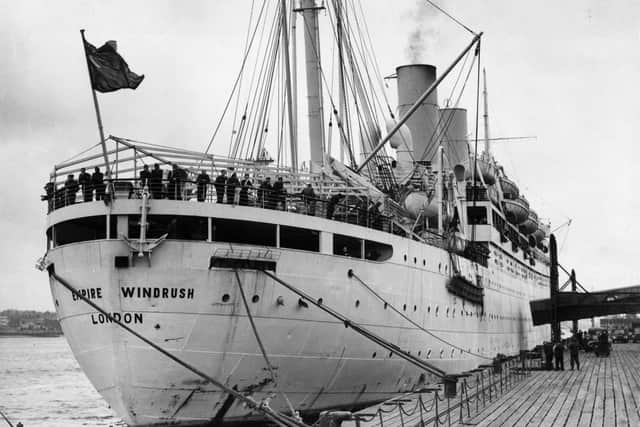Windrush 75: What is Windrush, who are the Windrush generation and Windrush history explained
and live on Freeview channel 276
The HMT Empire Windrush first arrived in the UK carrying passengers from the Caribbean to fill post-war labour shortages on June 22 1948.
In 2018 it emerged that the UK government did not properly record the details of the Windrush arrivals, sparking the scandal which uncovered how the Home Office wrongly denied Commonwealth citizens rights, detained them and, in some cases, deported them.
Advertisement
Hide AdAdvertisement
Hide AdAs the 75th anniversary of the Windrush arrival is commemorated, here is everything you need to know about the Windrush generation, the scandal, and the compensation scheme.
What is the Windrush?
The HMT Windrush was a vessel which carried 492 passengers from Caribbean countries to the UK in 1948.
It became a symbol of a wider mass migration movement, where Commonwealth citizens arrived to fill post-war labour shortages.
The ship’s passengers, many of them children, were granted the right to settle in the UK by the British Nationality Act 1948.


Advertisement
Hide AdAdvertisement
Hide AdThose legal rights meant those who had migrated did not need documents when they arrived, allowing them to settle indefinitely in the country without restrictions.
The first wave of the Windrush generation arrived in Tilbury, Essex on June 22 1948, and passengers were temporarily housed in south west London, close to an employment exchange in Brixton, where some of them sought work.
Many of the migrants only intended to stay in the UK for a few years, and although a number returned, the majority remained and settled permanently.
What is the Windrush generation?
Those born in Caribbean countries who settled in the UK between 1948 and 1971 are now widely referred to as the “Windrush generation”.
Advertisement
Hide AdAdvertisement
Hide AdIt’s unclear how many people belong to the Windrush generation, but the number is thought to be in the thousands.


According to the University of Oxford estimates, more than 500,000 UK residents were born in a Commonwealth country and arrived before 1971.
Among the Windrush passengers was Jamaican-British campaigner Sam Beaver King, who went on to become the first black Mayor of the London borough of Southwark.
What is the Windrush Scandal?
In 2018 it emerged that hundreds of people – who were part of the Windrush generation – had been wrongly detained, denied legal rights, and threatened with deportation by the UK Home Office.
Advertisement
Hide AdAdvertisement
Hide AdThe Conservative Government introduced a “hostile environment” immigration policy in 2012, which was designed to make settling in the UK as difficult as possible for undocumented migrants and ultimately to push them out of the country.
The policy tasked the NHS, banks, landlords, employers and many others with enforcing immigration controls.
Under the 1971 Immigration Act, Commonwealth citizens already living in the UK were given indefinite leave to remain. However, many of the Windrush generation fell foul of the new rules as many arrived in the country as children on their parents’ passports.
But the Home Office kept no record of those granted leave to remain and issued no paperwork, making it difficult for Windrush arrivals to prove their legal status. The Home Office also destroyed thousands of landing cards and records belonging to Windrush migrants in 2010.


Advertisement
Hide AdAdvertisement
Hide AdThey then placed the burden of proof on individuals, demanding that they prove their residency status was from before 1973. This led to hundreds of people – who had lived in Britain their whole lives – suddenly being told they needed evidence to continue working, getting NHS treatment or to even to remain in the UK.
Falsely deemed as ‘illegal immigrants’ or ‘undocumented migrants’, these citizens also began losing access to bank accounts, driving licences and housing, with many placed into immigration detention.
From the Windrush generation, these people were also prevented from travelling abroad, threatened with forcible removal and more. A review of historical cases found that at least 83 individuals who had arrived before 1973 had been deported, many to countries they hadn’t seen since they were children.
An inquiry into the scandal, released in 2020, said it was “foreseeable and avoidable", and the report criticised "a culture of disbelief and carelessness" in the Home Office.
Advertisement
Hide AdAdvertisement
Hide AdIn April 2018, then-Prime Minister Theresa May was forced to apologise to the Windrush generation for their treatment, and a compensation scheme was established.
What is the Windrush compensation scheme?
Established in April 2019, the Windrush Compensation Scheme was thought to have been “righting the wrongs” of the scandal.
Around 15,000 people were thought to have been eligible, but the scheme has been criticised for processing delays, low offers and unfair rejections which are reversed upon appeal.
However, in April 2023 the Human Rights Watch said the scheme was failing victims and branded it “hostile”, while in 2021 the Home Affairs Committee of MPs found that the scheme itself had become a further source of trauma.
Advertisement
Hide AdAdvertisement
Hide AdAt the end of September 2021 just 20.1% of the eligible claimants had applied, 5.8% had received any payment, and many individuals had died without receiving compensation at all.
“The treatment of the Windrush generation by successive governments and the Home Office was truly shameful,” said the committee in a statement.
“No amount of compensation could ever repay the fear, the humiliation and the hurt that was caused both to individuals and to communities affected.”


When is the Windrush anniversary?
Windrush Day has been commemorated on June 22 every year since 2018. The 75th anniversary is being remembered this year, with events taking place across the country.
In 2012 the Windrush’s arrival was even celebrated in the London Olympic opening ceremony.
Comment Guidelines
National World encourages reader discussion on our stories. User feedback, insights and back-and-forth exchanges add a rich layer of context to reporting. Please review our Community Guidelines before commenting.
